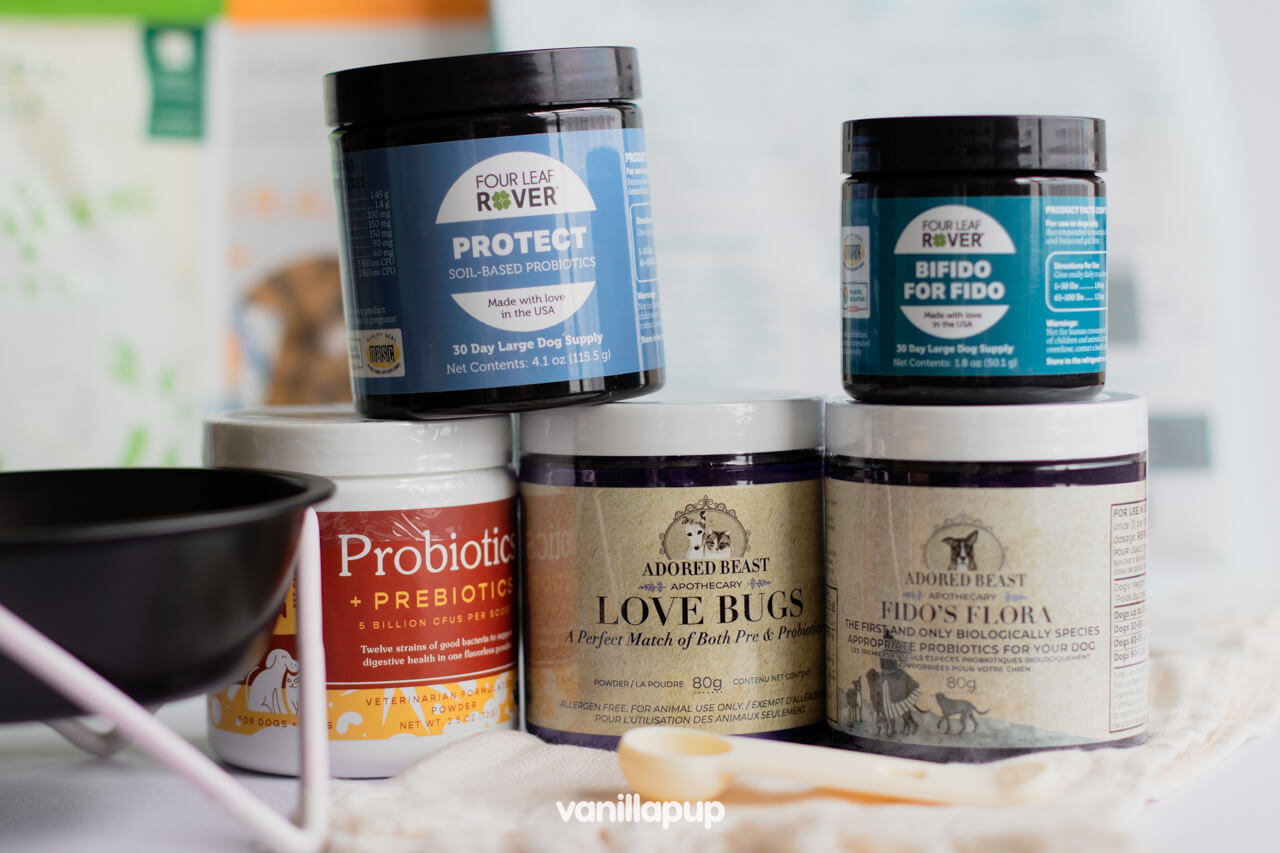Choosing probiotics can be a confusing process. There are many brands in the market and most brands offer not one, not two, but a handful of options. What information do we need to make a considered choice?
Before we touch on that, we must first have a little understanding of the gut microbiome.
Gut microbiome
Our gut is an amazing "second brain" and much like our brain, even specialists and scientists do not know everything about it.
Now, that makes choosing a product for the gut very tricky and we are unfortunately, doomed to make choices based on the latest information available to us.
What we do know is that our gut is made of trillions of microorganisms and it's the same for our dogs. These microbes help to digest food, protect us from diseases, and also send messages to the brain.
The fascinating thing is that our gut bacteria changes with the food we eat and similarly, the supplements we take. These bacteria then affect how our food is digested and what messages are sent to our brain. That means it has the ability to affect how you think and how you feel!
70-80% of our immune cells are also located in the gut, which means the immune system and the gut have to work together to protect our body and ensure our wellbeing. If one isn't functioning well, it will inevitably affect the other.
When our dog's gut microbiome is out of balance (dysbiosis), they may suffer from small issues like bloating and diarrhoea or bigger issues like SIBO and IBS.
Sometimes, dysbiosis can go away on its own or be resolved with a simple diet change. Other times, your dog may need some help from probiotic supplements.
Start with a fresh, well-balanced diet
A fresh, unprocessed diet is always the first step towards better health. Fresh diet is rich in nutrients, live bacteria and enzymes, and prebiotic fibre. A healthy, balanced diet should be the main approach to keeping the gut flora balanced.
Also read: Vanillapup Dog Food Guide
Healthy dogs do not need commercial probiotic supplementation
If your dog's gut and immune system are working well, which means they are healthy - good breath, poop and body condition, shiny fur, bright eyes, moist nose, and energetic, you do not need to feed them probiotics.
Introducing probiotic supplements when everything is in balance rocks the boat unnecessarily and can do more harm than good.
What issues can probiotics help tackle?
Here are some common conditions that probiotics can help with:
-
Loose stools or constipation
-
Gut disorders like Irritable Bowel Syndrome
-
Intestinal infections like Giardia
-
Small Intestinal Bacterial Overgrowth (SIBO)*
-
Indigestion and bloating
-
Inability to gain weight
-
Urinary Tract Infection
-
Immune disorders^
-
Anxiety and unstable mood
*Regular probiotics can worsen SIBO. Read further for more information. ^For immunocompromised dogs, consult a trusted vet before introducing any supplements.
Pre, pro, and postbiotics
We may have heard of prebiotics, probiotics, and the recently popular postbiotics. But how are they related to each other?
Prebiotics are, put simply, food that probiotics feed on. Probiotics are the well-known live good microbes that we need to keep the bad microbes in check. Finally, postbiotics are the non-living but beneficial byproducts produced when probiotics feed on prebiotics.
Fermented vegetables for dogs (think kimchi for humans) offer a natural source of all three 'biotics.
Postbiotics is now the trendiest of the three and some marketers are promoting it as the substitute to pre and probiotics supplements. They argue that postbiotic supplements offer more stable shelf life and the final benefits without having to go through the whole pre and probiotic fermentation process. However, more research will need to be done to confirm its efficacy.
For now, products with probiotics or synbiotics (pre and probiotics) are still the go-to supplementation.
Different types of probiotics for different issues
Lactic acid probiotics
Most probiotics in the market are lactic acid probiotics fermented from milk. For dogs with minor gut or skin issues, these readily available probiotics should usually do the trick.
Recommended products:
However, if your dog's regular lactic acid probiotics aren't showing results, canine-specific or soil-based probiotics may be worth sourcing out.
Canine-specific probiotics
Canine-specific strains of probiotics are believed to be superior as they are found in a healthy dog's microbiome (hence, more well-suited) and has a higher chance of surviving the digestive system to reach the colon. However, they are usually more expensive and not offered by most brands.
Recommended products:
Soil-based probiotics
Soil-based probiotics are gaining popularity for its resistance against heat and acidity. With modern farming and processing methods, we are losing the live, beneficial bacteria that used to be abundantly found in soil and hence, the food we eat.
Soil-based probiotics supplements are meant to replace what's lost in our diets today. Because of their hardiness, they are recommended for all dogs, notably dogs with SIBO, as they are able to reach the colon with less risk of worsening any bacterial overgrowth in the small intestines.
How do you know whether your dog has SIBO? Dogs with SIBO may have the following symptoms:
-
Flatulence
-
Chronic, intermittent small bowel diarrhoea (usually characterised by large amount at normal frequency, no straining)
-
Malabsorption, resulting in weight loss or inability to gain weight
-
Use of lactic acid probiotics may trigger flare ups
Recommended products:
-
Four Leaf Rover Protect (Soil-based probiotics with S. Boulardii)
Saccharomyces Boulardii
Saccharomyces Boulardii, also known as S. Boulardii, is a probiotic yeast that you probably have heard about or will hear more of for its amazing qualities.
It is resistant to antibiotics and is able to protect the gut from antibiotic damage.
It is said to be able to kill bad bacteria in the gut and alleviate issues like diarrhoea, SIBO, Giardia, Gastroenteritis, IBS, and IBD.
You can also pair S. Boulardii with another probiotic to weed out bad bacteria and replenish good ones.
Recommended products:
-
Four Leaf Rover Protect (Soil-based probiotics with S. Boulardii)
-
Four Leaf Rover Bifido (Lactic acid probiotics with S. Boulardii)
Rotating and combining different probiotics
You can rotate probiotics that offer different strains and CFUs to improve gut diversity or simply to test out which one works best for your dog.
When using two different probiotic products, it is recommended to reduce the dose of each accordingly.
Most importantly, always purchase probiotics from reputable brands that produce in certified facilities you can trust.
In closing
As mentioned at the start of the post, there's still much to discover about our digestive system. What's more, every body is different and many factors influence our microbiome.
It may take significant trial and error before finding the right diet and supplements for our dogs. Even then, things can change with age and changing environments.
The only thing we can do as pet parents is to keep up to date with the latest research and a close eye on our dog's health over time.
References:
Postbiotics: The New Kids in the Gut Health Family
Monsters Within: The Rapidly Advancing World of Canine Probiotics with Dr. Conor Brady



